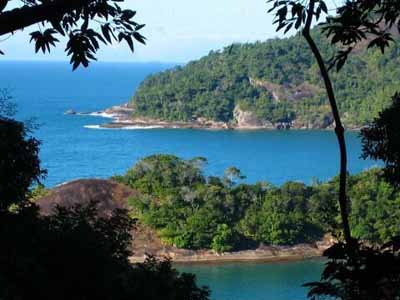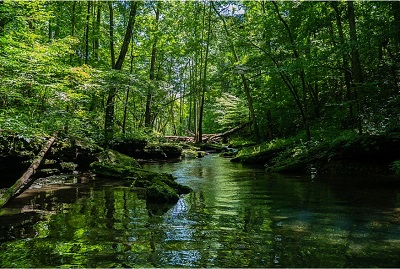 |
Organic Society
How Man Should Act over His Natural Environment
Plinio Corrêa de Oliveira
Let us consider a place where man has never been. Take Fernando de Noronha, for example, an island far from the Brazilian coast. Let's imagine that it was never inhabited by man. It is a relatively small island. Every once in a while a ship would stop there for a few days to take provisions of water and hunt some animals, but no man would be actually living there.

Man finds the synthesis of the high sea and firm land very pleasing |
An island like this would have a particularly pleasant and harmonic tone, which is a kind of synthesis between being on the high sea and firm land. An observer who would visit it would feel as if he were living isolated on the high sea. The entire atmosphere would be that of the high sea, but with the firmness of land. This can be very pleasant indeed.
But if many people would stay on that island for some time, something of that pleasure would diminish. Suppose that our observer would arrive after some ships had been there for two or three weeks. He would feel a delight in experiencing nature in its pure state, the delight of sensing a certain order God put in nature through which man can admire His wisdom and goodness. That agreeable situation would reflect the privilege of knowing an environment as it came from the hands of God. This would be, properly speaking, the natural order in its best meaning.
Now, if a group of fishermen would found a village on that island, something would be harmed. I am not talking about the maritime atmosphere, the panorama or the fresh air, which would continue to be exactly the same. But something about the island would be lost.
If we all agree on this observation, we could go further and say that the presence of man breaks something of the presence of God in nature. This presence of God would diminish as the human presence on the island would increase.
Man is a broken king of nature
This would appear to be a contradiction because since man is the king of nature, one would say that his presence improves nature. Generally, man makes nature more pleasant and interesting.
Let us say that the man who owns the island would transform part of that virgin forest into a park and build an attractive house. Then, on the other side of the island, he would construct a small cottage so that he could go there at times to rest and have a change of view and air. With this he would have the pleasure of variety. He also would cultivate a banana plantation, so that the island would benefit from having both an agreeable park and a useful plantation. One would thus say that Fernando de Noronha profited by being inhabited by its king, man.
Is it as simple as this? We need to distinguish several things here.
We can understand that man, using his God-given intelligence and capacity to transform the environment, can improve some parts – or even the ensemble – of the island. It could well become more beautiful, more agreeable, etc.

After original sin it is difficult for man to touch nature without disrupting God's pristine plan |
Further, we can also understand that the presence of men adds a certain charm to the island. For example, let us suppose that in the park he made a quite civilized lane that leads up to some high rocks where one can gaze out and view the whole horizon. On that spot he planted beautiful shade trees and placed some comfortable benches so that a person could sit there for a long time admiring the panorama.
Men with a certain good taste and formation, such as the one we described, may well bring more grace, charm and beauty to that hypothetic island. So, we agree that something positive was added to the original state.
However, since man inherited original sin, he is not the perfect king he should be of nature. He is a broken king, just like a broken cup that we glued back together and still use to drink tea. It is serviceable but it will never again be what it used to be before it was broken. So also is the kingship of man over nature.
Because he is conceived in original sin, he sometimes exaggerates, taking from nature more than he should. Other times he is sloppy or lazy and does not take advantage of things that he should. Yet other times, through bad taste he spoils the charm of the ensemble - it would have been better for him not to have touched certain things here and there.
Therefore, we must admit that, on one hand, man’s presence made a certain improvement to the island; on the other hand, in many ways he harmed it. When he acts upon nature, disordered aspects normally go along with the embellishing and civilizing aspects in a way that cannot be disassociated. This deteriorating/civilizing action can reach the point that a person who saw that island in its original pristine stage without men might well question whether it was better or not for men to have inhabited it.
These considerations give us some guidelines for man’s development of an environment in nature.
The sadness of nature after original sin
We could say that when Adam and Eve were expelled from Paradise, a great sadness fell over Paradise and earthly nature because their King and Queen had been corrupted. Man and woman were the natural adornment of Paradise and nature and, with their degradation, both suffered and became less beautiful, bearing in themselves a note of that decay. On the other hand, something of that original beauty remained and continued, and nature still gives us some idea of the original plan of God for it as well as a notion of how it would have developed if man had not sinned.
So, when man acts over a natural environment, he must take into consideration these factors:
- What still reflects the original paradisiacal plan of God in that ambience and, therefore, should be kept and improved;
- What aspect of the sadness of original sin should be maintained in order to remind us that we live in a valley of tears;
- What marks of sin exist in it that should be expurgated;
- What traces of the Devil are present in it that must be combated.
In short, man needs to discern what are the legitimate changes he should make in nature as its king to complete the plan of God and what are the unwise changes he wants to make as a consequence of his wicked passions.
Thus, our example of the hypothetical island of Fernando de Noronha has given us some criteria to determine how man should act over nature.
At the next opportunity, we will apply these criteria to the notion of progress.

Posted April 27, 2009

  | | Prof. Plinio |
Organic Society was a theme dear to the late Prof. Plinio Corrêa de Oliveira. He addressed this topic on countless occasions during his life - at times in lectures for the formation of his disciples, at times in meetings with friends who gathered to study the social aspects and history of Christendom, at times just in passing.
Atila S. Guimarães selected excerpts of these lectures and conversations from the trancripts of tapes and his own personal notes. He translated and adapted them into articles for the TIA website. In these texts fidelity to the original ideas and words is kept as much as possible.

Related Topics of Interest
 Questions on Ecology Questions on Ecology
 Proportion between the City and the Man Proportion between the City and the Man
 Restoring a Closed Economy Restoring a Closed Economy
 What America Eats - A New Tendency Sprouts What America Eats - A New Tendency Sprouts
 Opposed Poles of Society: Prestige and Money Opposed Poles of Society: Prestige and Money
 Critique of Capitalism from an Organic Perspective - Part I Critique of Capitalism from an Organic Perspective - Part I
 Distributist Leaders Mislead Their Audience about Capitalism Distributist Leaders Mislead Their Audience about Capitalism
 Vocations of the European Peoples Vocations of the European Peoples

Related Works of Interest
|
|
Organic Society | Social-Political | Home | Books | CDs | Search | Contact Us | Donate

© 2002-
Tradition in Action, Inc. All Rights Reserved
|
 |
|